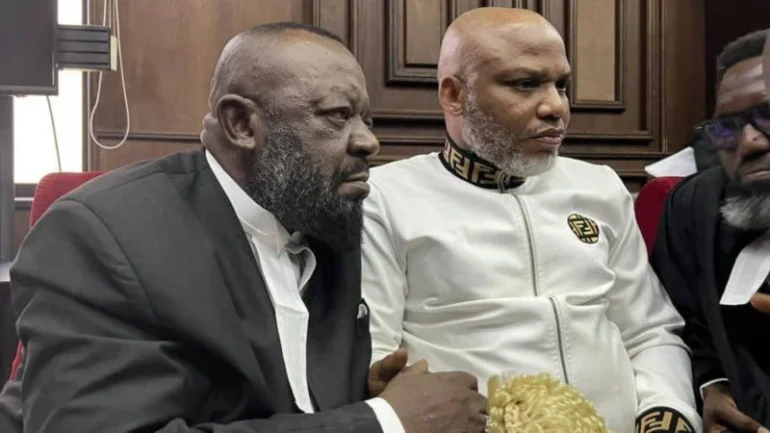Aloy Ejimakor, the lead counsel for Nnamdi Kanu, leader of the Indigenous People of Biafra (IPOB), has rejected the Federal Government’s request to set a date for the resumption of his client’s trial.
Ejimakor shared the development in a tweet on Tuesday, reaffirming that despite Kanu’s ongoing detention, he remains resilient and continues to receive three visitations weekly.
Kanu is facing prosecution on seven counts related to alleged treasonable felony and terrorism. The IPOB leader, who pleaded not guilty to the charges, was re-arrested in Kenya in 2021 and extradited to Nigeria.
In the last court session on September 24, 2024, Kanu requested that Justice Binta Nyako recuse herself from overseeing his case, citing a lack of confidence in the court. Justice Nyako subsequently stepped down and referred the case to the Chief Judge of the Federal High Court for reassignment.
However, the Chief Judge returned the case to Justice Nyako, arguing that, given her extensive handling of the case, she was best positioned to bring it to a conclusion. The Chief Judge also directed that Kanu must file a formal motion, supported by an affidavit, if he insists on seeking Justice Nyako’s recusal.
On December 5, 2024, the Federal Government’s counsel, Adegboyega Awomolo, wrote to the Deputy Chief Registrar of the Federal High Court requesting that a date be set for the continuation of the trial. The letter referenced Kanu’s previous request for Justice Nyako’s recusal and the Chief Judge’s decision to return the case to her.
In response, Ejimakor formally objected to the Federal Government’s request, arguing that Justice Nyako’s order to recuse herself is still valid. He emphasized in a letter to the Deputy Chief Registrar that the recusal order, made on September 24, 2024, remains in effect, as it has not been overturned by any competent court.
Ejimakor further warned that moving forward with the Federal Government’s request could mislead the court into unconstitutional actions, describing the application as “fatally misconceived.”


